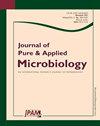利用微生物生物刺激剂提高果树的非生物胁迫耐受性
IF 0.7
Q4 MICROBIOLOGY
引用次数: 0
摘要
由于各种非生物胁迫因素,全球气候变化导致许多作物大幅减产。这些压力包括干旱和洪水等与水有关的问题、极低和极高温度等热变化、盐度以及包括碱度和酸度在内的不利土壤 pH 值条件。生物刺激素已成为减轻这些非生物压力对植物造成的损害,最终提高作物产量和质量的前景广阔的有效工具。生物刺激素是天然提取的物质,包括腐殖酸、蛋白质水解物、含氮化合物、海藻提取物、有益细菌和霉菌。即使浓度很低,生物刺激素也能在激活重要的植物酶、诱导抗氧化防御、改善水分关系和光合作用、刺激激素类活动(尤其是辅助素、赤霉素和细胞分裂素)以及调节根系发育等方面发挥关键作用。本综述讨论了微生物生物刺激剂对水果作物质量和产量的生理影响及其实验应用。本文章由计算机程序翻译,如有差异,请以英文原文为准。
Enhancing Abiotic Stress Tolerance in Fruit Trees Using Microbial Biostimulants
Global climate change has significantly reduced the yield of many crops due to various abiotic stressors. These stressors include water-related issues such as drought and flooding, thermal changes like extremely low and high temperatures, salinity, and adverse soil pH conditions including alkalinity and acidity. Biostimulants have emerged as promising and effective tools for mitigating the damage caused by these abiotic stressors in plants, ultimately enhancing both the quantity and quality of crops. Biostimulants are naturally derived substances that include humic acid, protein hydrolysates, nitrogenous compounds, seaweed extracts, beneficial bacteria, and molds. Even at low concentrations, biostimulants play a critical role in activating important plant enzymes, inducing antioxidant defenses, improving water relations and photosynthetic activity, stimulating hormone-like activities (particularly auxins, gibberellins, and cytokinins), and modulating root system development. This review discusses the physiological effects of microbial biostimulants on the quality and productivity of fruit crops, as well as their experimental applications.
求助全文
通过发布文献求助,成功后即可免费获取论文全文。
去求助
来源期刊

Journal of Pure and Applied Microbiology
BIOTECHNOLOGY & APPLIED MICROBIOLOGY-MICROBIOLOGY
CiteScore
2.00
自引率
0.00%
发文量
266
审稿时长
11 months
期刊介绍:
Journal of Pure and Applied Microbiology (JPAM) is a peer-reviewed, open access international journal of microbiology aims to advance and disseminate research among scientists, academics, clinicians and microbiologists around the world. JPAM publishes high-quality research in all aspects of microbiology in both online and print form on quarterly basis.
 求助内容:
求助内容: 应助结果提醒方式:
应助结果提醒方式:


